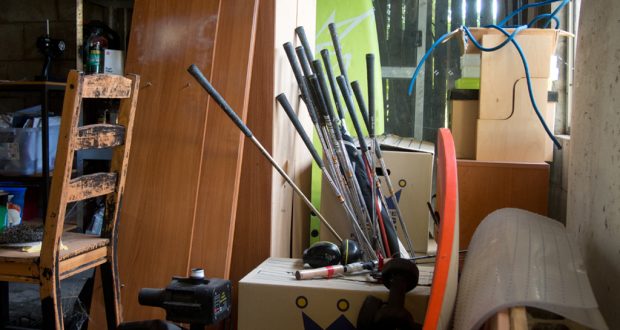Can’t get your car into your garage because of all those boxes stored in the back? Dianne Jensen explores why letting go of stuff is good for body and soul.
What do the following items have in common: an open bottle of olive oil, coat hangers, a rainbow of Taekwondo belts, a tangle of computer leads and a handful of bobby pins?
This is a trick question. All these items are some of the flotsam currently piled up in my family room as a result of a temporary shift back home by an adult child.
After several major moves overseas and interstate, I understand the emotional upheaval generated by packing up your worldly goods. The clichés rise unbidden as you sort through the accumulation of a lifetime: “What was I thinking?”, and worse, “Where have the years gone?”
For the parent whose fledglings are between nests, these moments of emotional flagellation are made worse by the fact that you waved off these same boxes and suitcases with a few sentimental tears just a few short months ago. Foolish optimist.
It’s all back. And experience has taught every parent with a garage bulging with appliances and netball trophies that the promises of their offspring to retrieve and/or dispose of their belongings are about as reliable as the promises of Laban that Jacob would get to marry Rachel some time soon.
This accumulation of stuff is such a basic instinct that we don’t even notice the steady growth of possessions. That is, until we literally run out of space or move house.
I can’t lie, I’m not without sin. My acquisitive self with an eye for a bargain is constantly at war with my ascetic self who yearns for an uncluttered, simple life.
The biggest problem with all this stuff is that it weighs us down, both in the literal and metaphysical sense. Not only must I carry every stick of furniture and piece of crockery with me should I chose to relocate or even downsize, I am enmeshed in the web of hopes, dreams and expectations represented by all these objects.
Even the precious childhood mementos I tucked away over the years have morphed into a pile of cartons stuffed with baby clothes, artwork and those ubiquitous participation ribbons.
Am I building my own web around my children, hoping that these tangible proofs of their childish dependence and the love and care poured out by their parents will bind them to us?
It was the Victorians who taught us to be sentimental. They were the first generation to be able to photograph their loved ones, so that faces and events no longer faded with time and memory.
The newly emerging 19th century middle class doted on paintings of puppies and cherubic children, and cried over the cruel fate of Charles Dickens’ little Nell, all the while ignoring the poverty and injustice that undergirded their comfortable lives.
Sentimentality is a faux emotion, a saccharine version of love which places more value on objects and emotions than living breathing people.
Letting go of the possessions which no longer serve us is part of allowing ourselves to be constantly re-born. Furniture we bought for our first apartment, toys that were played with by children now grown, favourite books that are falling apart. These things no longer enrich our lives, they hold us back from becoming someone new.
Be brave. You don’t need all those things to remember loving and being loved. This New Year, take time to look at your possessions from the perspective of the person you are today—and the one you are yet to become. Anything that doesn’t bring life no longer has a place.
 JourneyOnline
JourneyOnline






